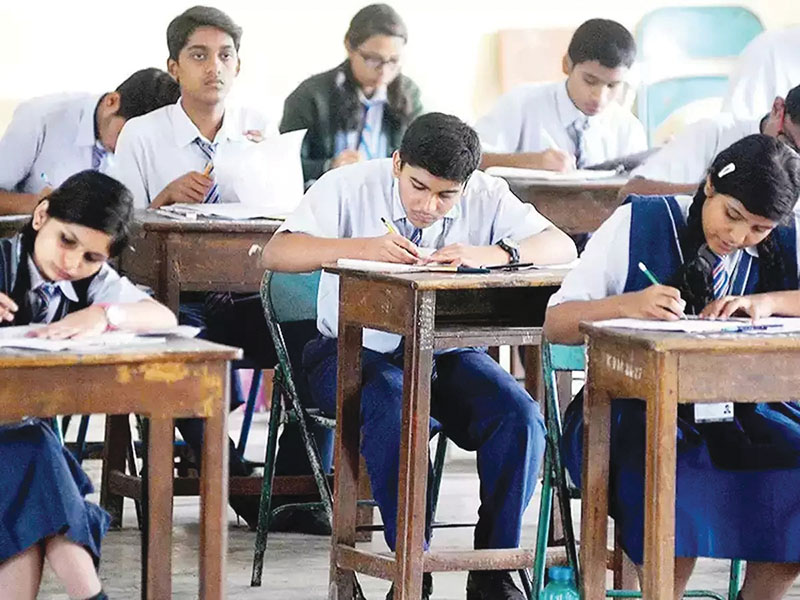Autar Nehru (Delhi)

CBSE exam students: second chance
A public notice issued on February 25 by the Central Board of Secondary Education (CBSE) — India’s largest national school-leaving examinations board which has 30,700 Central government and upscale private schools affiliated with it — to the effect that it will conduct two class X school-leaving exams from start of this academic year (2025-26), has provoked mixed reactions.
From next year onward, students can write or rewrite the class X exam — whose results determine entry into top-ranked junior college/higher secondary classes — between February 17-March 6 and/or May 5-20. According to the CBSE notice, students can write the whole exam again or rewrite subject papers in which they didn’t fare well. The higher average score will be certified as final.
The rationale of this proposal is a directive of the National Education Policy (NEP) 2020 paragraphs 4.37 and 4.38 which mandate two school-leaving exams to “eliminate the need for undertaking coaching classes,” “eliminate the high stakes aspect of Board Exams” and provide “greater flexibility, student choice, and best-of-two attempts”. According to the notice, students rewriting the class X exam will write it from the previous exam centre and will pay an “enhanced fee”. A short time window until March 9 has been provided for feedback from stakeholders and the public.
The short time window for feedback indicates that to all intents and purposes it is a fait accompli. In this connection, it’s noteworthy that while children in India have only one option to write do-or-die school-leaving exams, Cambridge International’s GCSE and ‘A’ level exams can be written twice per year and the International Baccalaureate Diploma exam three times annually.
While CBSE’s two class X exams per year policy has been welcomed by students and parents, school managements anticipate a host of implementation difficulties and adverse impact on teaching-learning. According to Suresh Chander, founder-managing director of the Grand Columbus International School, Faridabad and President of the Haryana Progressive Schools Conference, which has a membership of over 500 CBSE-affiliated schools, “ground realities aren’t conducive” for the prolonged examinations schedule proposed by CBSE. “With exams stretched over two months, deploying teachers for evaluation will compel school managements to reduce classroom teaching time. The outcome will be to drive students into coaching schools rather than eliminate and reduce dependence on them which is the stated objective of this proposal,” says Chander.
Dr. Sudha Acharya, principal of the CBSE-affiliated ITL Public School, Dwarka, Delhi and former chairperson of the National Progressive Schools Conference (NPSC) which comprises 201 CBSE-affiliated schools, also envisages practical problems relating to staging two class X exams per year. According to her, when schools designated as CBSE exam centres stage two exams annually, the number of days for classroom teaching-learning will be reduced to a mere 100 against the 210 mandated by the Right of Children to Free and Compulsory Education (RTE) Act, 2009, if school closures on account of national holidays, pollution, harsh weather etc “which have become frequent in recent years” are added.
“While two exams provide students an opportunity to improve their scores, students may be pressured to write them twice to further improve their scores. With the examinations season stretching to a period of approximately four months — February to May — the teaching calendar will go for a toss. Moreover, teachers will have to evaluate exam papers twice every year which means they can’t utilise the summer vacations for personal and professional growth,” says Acharya
Academics also fear that staging class X exams twice per year, is actually a trial balloon for also staging the more important class XII exam, the results of which determine entry into the country’s top-ranked undergrad colleges. If successfully implemented, the twice-per-year class X exam will be abolished in favour of two class XII exams. The strain of holding four school-leaving exams per year will prove unbearable for the school system weakened by continuous under-investment in public education and official and unofficial ceilings on tuition fees of private schools. Unable to build sufficient infrastructure and recruit larger number of teachers to improve bench strength, India’s 1.10 million public and 411,421 private schools have a long way before they can adopt international practices.